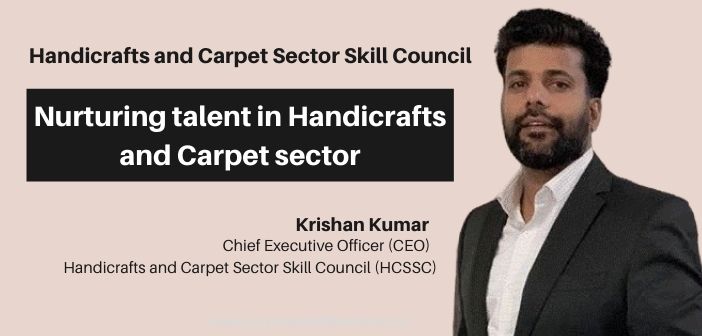Handicrafts and carpets are an integral part of India’s glorious legacy. There is hardly any part of India which is not known for its specially crafted and weaved items. The industry is vast and versatile. Be it the bamboo crafts of Tripura or the other crafts and carpets from different states, they all have their own story to tell and have huge potential to generate employment and promote entrepreneurship.
There is no dearth of talent in this sector; it just needs to be harnessed with right skills and knowledge. To know more about the opportunities in the Handicrafts sector, Team NSN interacted with Mr. Krishan Kumar, Chief Executive Officer (CEO), Handicrafts and Carpet Sector Skill Council (HCSSC) In this skill talk, Mr. Krishan Kumar gives an insight into the handicraft industry. Read on to know more.
Q. Could you please share the journey of HCSSC so far?
Ans: The journey of HCSSC has never been easy; we started the Handicrafts and Carpet Sector Skill Council in January 2014, with a very strong vision of the growth of Handicrafts and Carpet industry and give sustainability to the community of artisans in India. Various measures are taken by the government to promote Handicrafts and Carpet since the average earning of a craftsperson, when compared to that of other occupations, is very low.
Hence, the younger generation is moving to other fields with only the elder craftsmen being left behind. The country needs the younger generation of craftsmen to carry on the tradition of Handicrafts and Carpet, and this is only possible by ensuring the assistance of craftsmen to improve their techniques, availability of quality raw materials, direct marketing channels, credit, and better wages and providing them with socioeconomic benefits.
Q. Is there a scope for implementation of new technologies in the Industry? How do you plan to adapt to the new technologies?
Ans. Due to continuous advancement of the technologies in the manufacturing process, the Handicraft and Carpet sector in India is still not able to take a further steps as compared to other south-eastern countries. There is also no specialized institution in India to work as an umbrella organization for imparting specialized and industry-oriented training, both short-term and long-term.
The proposed skill development and customized training programmes is a step in this direction. It is also very important to address the local products made by artisans requiring a global recognition which can only be made possible by means of latest technology, e-commerce and Visual Merchandising.
Q. What is the vision for a vocational degree in the Handicrafts Industry?
Ans. At present there is no formal or informal customized or tailor-made skill development or training programmes being conducted for the artisans / manufacturers/ exporters cluster-wise and product-wise.
There has been a long-felt need to institutionalize the training / skill development in the Handicraft and Carpet sector. This is an ongoing process with an objective to equip the existing manpower with latest know-how in all the areas which have become a statutory requirement for the overseas customers as well as the Indian domestic market.
None of the institutions in the country have specialized courses which are related to the Handicraft and Carpet sector. We still haven’t designed or implemented structured curriculum with practical components to be run by ITI type of institutions in any of the craft pockets such as Carpentry School, Woodworking Institute of Metalworking Institute or Tool Making Centre etc.
 Q. How can employment opportunities and career growth in the Handicraft industry reduce rural migration?
Q. How can employment opportunities and career growth in the Handicraft industry reduce rural migration?
Ans. Artisans have a vital role to play in the economic development of the country. They have certain inherent basic skills, which, if identified and harnessed well, would usher in a new era. The Government of India and the State Governments have realized this role of the artisans, who most form a part of economically challenged section of the society. Since they are fairly labour-intensive, small-scale industries create employment opportunities at a relatively low capital cost.
In India there is a basic problem of creating employment opportunities even for the skilled manpower/Artisans due to the sector is being limited and unorganized with reference to jobs/wage employment. In pursuance of Industrial Policy, we need to re-orient industrial growth to serve the objectives of employment generation, dispersal of industry in rural areas and to enhance the contribution of small scale industries to exports.
Q. How important is faculty development to implement industry-integrated programs like B.Voc, when offered in this sector?
Ans. For career progression in vertical and horizontal segments, B.Voc and industry-integrated courses are required for the community of artisans in order to cover large number of artisans. This is even more essential since, at present we don’t have any standard structural education platforms for the unorganized sectors for example, Handicrafts and Carpet.
The main advantage of choosing a B.Voc degree is that it assures you with employment as soon as you finish the course. For those who aim to have a job just after finishing a degree course can right away opt for a B.Voc course. The B.Voc courses also develop the entrepreneurial skills of the students in a great way. Hence, if you aspire to be an entrepreneur, you can confidently apply your skills to develop a business of your choice.
Q. What is your vision for young professionals who are yet to join the workforce in this sector?
Ans. The planning commission acknowledges the fact that the unorganized sector that constitutes about 93% of the workforce doesn’t have a structured system to support acquiring or upgrading of skills. Training needs in this sector are multi-skill oriented and very diverse. It is the time for the sector to explore public-private-partnership models to bring about greater efficiencies. Such an approach will promote sustained growth of the Handicraft and Carpet clusters and sustained earnings for the artisans.
There is a need to clearly define production infrastructure, forward and backward linkages as well as any other critical infrastructure gaps that may be present. Some of the projects are discontinued due to lack of commitment and insufficient manpower of the implementing agencies. Requisite experience in handling Handicraft and Carpet sector and management skills in handling large projects need to be some of the major criteria in selection of implementing agencies.
Also read: Hunnarbaaz series: Skills and jobs in handlooms and handicrafts https://nationalskillsnetwork.in/handloom-handicraft-sector/3/
Q. Please share your views on the importance of apprenticeships and RPL 4 in the Handicraft Industry?
Ans. Handicrafts and Carpet sector is an unorganized sector with only a limited number of industries in existence and has no formal employment set up. Major challenge can be attributed to the fact that the unorganized and informal sector comprises the self-employed, wage labour and contract labour workers. Therefore, under the NAPS scheme, to be an employer requires too much paperwork, for which our cottage industry owners/enterprises are not much capacitated. Also, the bandwidth in terms of number of employees is very limited and contractual in nature. In such scenarios, it becomes difficult to arrange apprenticeships for trainees as there are no such large setting factories wherein they can be provided such opportunities.
To retain the glory of the Handicraft sector, the talent need to be nurtured with the right skill. There should be degree, diploma and certification courses. Awareness should be created among people regarding the industry to attract more and more young talent.



 Q. How can employment opportunities and career growth in the Handicraft industry reduce rural migration?
Q. How can employment opportunities and career growth in the Handicraft industry reduce rural migration?










